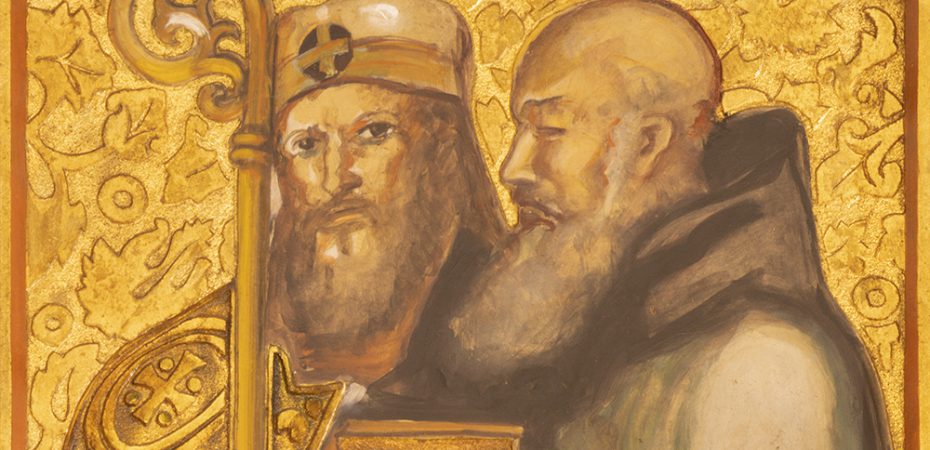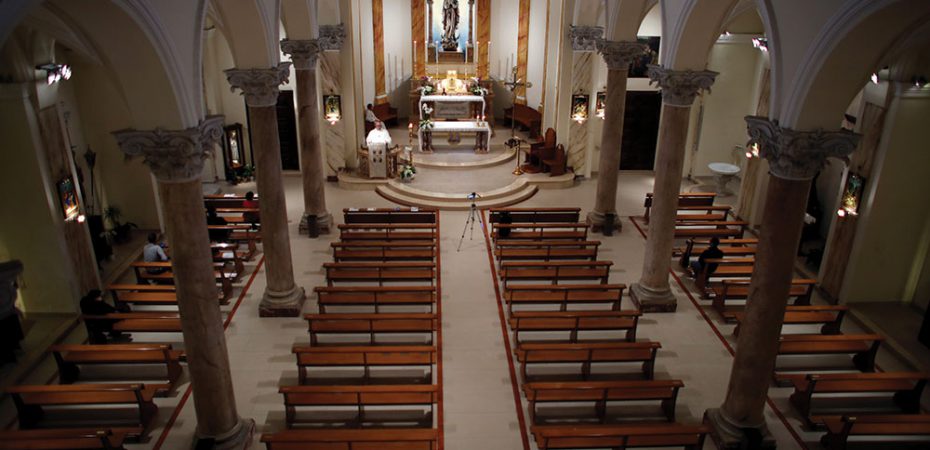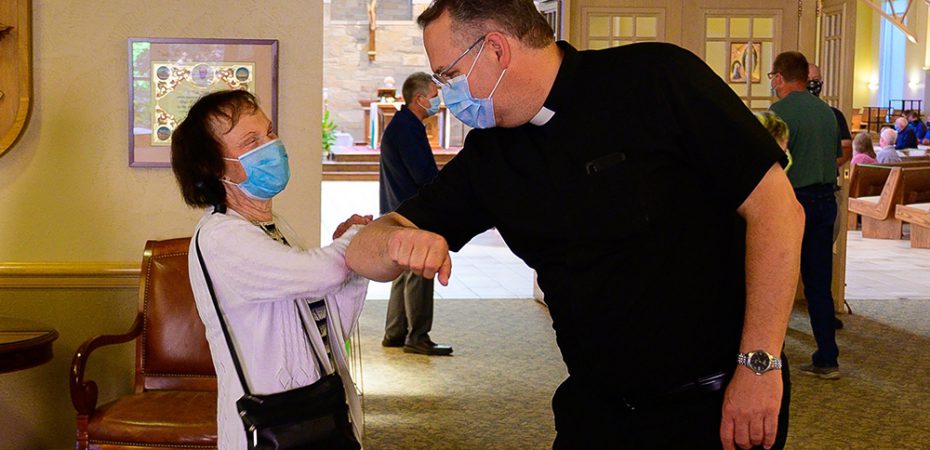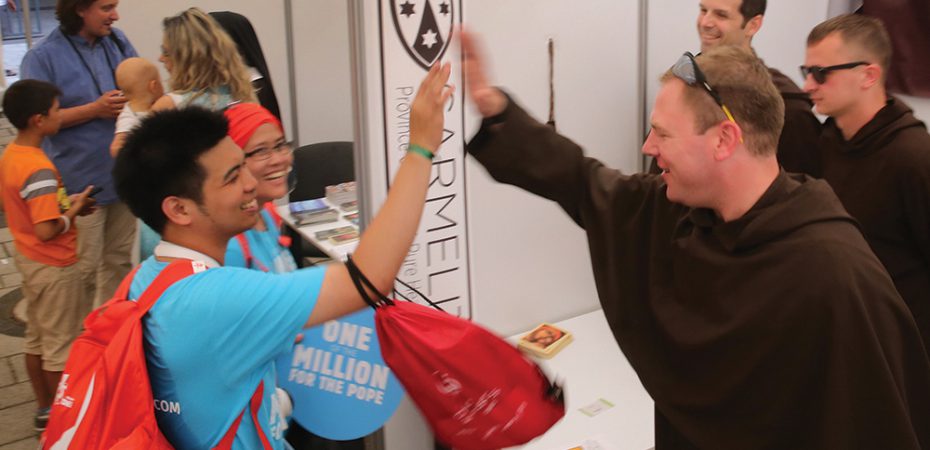Class of 1962
A priest looks back at his ordination on the cusp of Vatican II
Father James McKarns Comments Off on Class of 1962
It was springtime. It was anticipation time. It was ordination time on the cusp of the Second Vatican Council.
It was 1962, and we young seminarians at Mount St. Mary’s Seminary outside Cincinnati were desirous and ready to be ordained by our respective bishops in our home dioceses in the closing week of May.
There were 30 of us — average age 26 — from dioceses across Ohio and Indiana: 11 from Youngstown, nine from Toledo, four from Columbus, two from Cincinnati, two from Fort Wayne-South Bend, one from Gary and one from Lafayette.
In our common objective of priesthood, we had shared years in classes of theology, philosophy, liturgy, homiletics and canon law. We had prayed together at community Masses and other spiritual devotions, along with participating in mutual recreation and social gatherings. We were required to wear cassocks whenever not in our rooms except when engaged in some sporting event.
A few weeks before my ordination, I wrote a few verses about my wishes for the future: I dream of offering up the Mass, praying for the dead. / Teaching children morning prayers and counseling the wed. / I dream of preaching to the fold for which my Master died. / I dream of finding sorted souls to leave them purified. / I dream that someday I’ll look back on all my youthful plans. / My inner eye shall watch them pass, like distant caravans. / Now I’m young and full of hope, but there I’m old and bent. / Now earthly time seems long indeed, but there ’tis nearly spent. / Beyond the hopes of coming years at some future time extreme; / I’ll see myself just looking back, on what is now a dream.
Today, during these octogenarian years of my life, I am at that point of looking back at those young years and early dreams.
Of the 30 men who graduated with me, 10 of us are still living, 15 have died and five have left the priesthood. My reflections focus on numerous priests of the ordination classes in the surrounding years, before and closely following the beginning of Vatican II. Their names and ours are now honorably graced with the distinguished title of emeritus.
The Class of 1962 had some unique experiences leading up to ordination, experiences that opened a small window on the important events occurring in our Church and country at the time. I write as I remember, keeping in mind the insight offered by the late American psychologist, Carl Rogers, who said that when we speak most individually, we speak most universally.
Here I give only some snippets, or CliffsNotes, of five people and events that influenced our thinking, boosted our confidence and spiritually motivated us into our beginning ministry. We were very confident because the bright stars, so to speak, were lining up to indicate favorable omens.
Pope John XXIII
The election of Pope John XXIII in October 1958, during our formation, was an inspiring event. He gave us a very different image of the papacy after 19 years of Pope Pius XII, who had been, by contrast, rather somber and ascetic. John joked and laughed. Then, only three months after his election, he announced an ecumenical gathering of bishops and others from around the world to update the Church. It would be called the Second Vatican Council. He said he wanted “to open the windows of the Church so that we can see out and the people can see in.”
With ordination drawing near, we had numerous speculations and discussions about what changes would come in the Church and how we were to promote them. We did not worry about these changes; we joyfully welcomed them.
Father Eugene Maly
We had as a professor Father Eugene Maly, who had recently returned from the Biblicum with a doctorate in Sacred Scripture. Within the first few classes, I thought he had turned my biblical world upside down. Soon we realized we had experienced a seismic shift; the world was back in proper orbit, and Father Maly was our Rosetta stone to help us decipher ancient Near East texts and follow the biblical North Star on our faith journey. We were amazed and delighted to learn the correct exegesis of Genesis, chapters 1-11, along with form criticism, sensus plenior and midrash. Father Maly was berated with some harsh criticism when his students went home for Christmas and “instructed” their pastors about the Wise Men and the star of Bethlehem.
Biblical study has greatly expanded since then, but way back in 1962, Father Gene Maly taught us basic principles that are still valid today. He taught us to have biblical intelligence, and he was spot-on. Our class has been ever grateful for our professor par excellence — a term he often used.
President John F. Kennedy
John F. Kennedy was elected as the first Catholic president less than two years before our ordination. It was a breakthrough in the history of bigotry and prejudice against Catholics in the United States; only 30 years before, presidential candidate Al Smith had been rejected because of anti-Catholic bias. With the exception of a few students, we all wanted to support Kennedy’s candidacy. He was making progress when he entered the primary in West Virginia, facing a critical time. We understood that his candidacy could be derailed in West Virginia, as the state was only about 4% Catholic. When he won the primary, there was loud cheering in the hallways. Several students shouted that the unexpected phenomena should be classified as a genuine miracle.
The Rev. Martin Luther King Jr.
At that time, Martin Luther King Jr. was speaking out bravely against racial prejudice in spite of constant bigotry, racial slurs and death threats. We were inspired by him as a living prophet in our society as we read and studied Old Testament prophets of social justice like Amos.
Just one incident highlights the atmosphere of those years. In 1964, King received the Nobel Peace Prize. A reporter asked former President Harry Truman what he thought about King. Truman said he was “one of the first-class troublemakers.” The reporter persisted, noting that he had won the Nobel Peace Prize. Truman replied, “I didn’t give it to him.” King would have made the prophet Amos proud, and he made us proud, too.
John Glenn
A few months before our ordination, astronaut John Glenn uplifted our thoughts as a role model of adventure and bravery. His knowledge, ability and expression of Christian faith were inspiring. We prayed for him to return safely from circling the planet, and when he did, he reported that his views of Earth from space had deepened his belief in God. Religion and science were holding hands looking skyward, each seeking truth in its own way.
With ordination only a few weeks away, I recall having a very positive and confident feeling in both the Church and society in general. There was an optimistic rush of renaissance resurgence. I think all my classmates felt that the road was bright and springtime buds were starting to display bright colors that would flower into the waiting future.
Learning on the Job
Our first three years as newly ordained priests coincided with Vatican II, which was in session October 1962 to December 1965. During that time, a neighboring bishop who spoke to clergy pointed out that it was as if we younger priests had been trained to play football, but when we came running out on the field, we were told that we’d be playing soccer. We didn’t know the rules. We had to learn on the job.
The Second Vatican Council encouraged priests to be closer to the People of God as we walked with them on our pilgrimage. As we know, Trent was a doctrinal-centered council, while Vatican II was pastoral.
The old familiar Latin prayers of the Mass we knew from childhood were now in English. It was a good decision. We knew the English words were as holy as Latin and better for all to understand; it was just a matter of getting used to them. Most older priests I know experienced a shifting security in their routine of liturgical ministry. Facing the people during Mass, I know, was especially challenging.
Ecumenism was a term frequently heard and repeated. We needed to explain its meaning of cooperation and worship with our fellow Christians. Spontaneous prayer was often being called for when we had been comfortable simply saying Our Fathers or Hail Marys.
Today Is Still ‘Our Day’
I hope my fellow long-lived brothers in priesthood can beneficially relate to these memories. May you call to mind again your own thoughts and experiences, as well as how you reacted to them and how you were motivated in your faith and ministry.
The few verses I recounted previously were about dreaming of someday looking back to 1962. At present I simply stand in gratitude and admiration of my clerical brothers, especially those now living their later days. Realize, as the old prose poem “Desiderata” says, that each of us is a child of the universe.

Sometimes people talk to the elderly using the phrase “back in your day.” I retort, “Isn’t this my day also?” We may be retired, but we have a right to be here, proud of our achievements and respected and loved by many. The Lord has given us priestly dignity.
To the younger clergy of today, be assured that we of the previous generations know and appreciate how you are dealing with some really big challenges, some tougher than we had to work through. We all continue our journey, knowing it is the same Lord we serve and the same Church. In faith we affirm that when the Lord calls us to a task, the Lord will provide the grace to accomplish it.
Advice for the Remaining Years
Elderly priests, I suggest, should especially excel in gratitude, because after living so many years we have a much longer list of parishioners, friends and things for which we can be grateful.
Patience, I believe, should be one of our stellar virtues. Our own rapidity needs to be checked, because, well, we don’t have any other option. Many times, in former years, we’ve probably had to say: “I’m pretty busy right now. How about later?” Now is that later time. I want to sit down with you and listen to your story.
Many of us have been blessed by having a salary, other stipends and now a pension and Social Security. Besides the charities we support, we can have an attitude of hospitable generosity, as we have preached that it is more blessed to give than receive. Doing so brings much happiness and fulfillment.
In these last days of life for which the first was made, we really should include in our backpack of virtues that precious quality of forgiveness. It should be exercised often as the necessary prelude to a peaceful heart. Forgiveness is the quickest and easiest way to pave over the speed bumps of life.
Can we picture ourselves in this scene?
At God’s footstool, to confess,
An old priest knelt and bowed his head,
“I failed!” he cried, but the Master said:
“You did your best. That is success!”
We can offer a hope-filled prayer for one another:
May the eyes of the Lord watch over us.
May the feet of the Lord walk beside us.
May the arms of the Lord hold us
In God’s everlasting love.
Father James McKarns, a retired priest of the Diocese of Youngstown, Ohio, is the author of several books on Scripture, homiletics and self-help.





